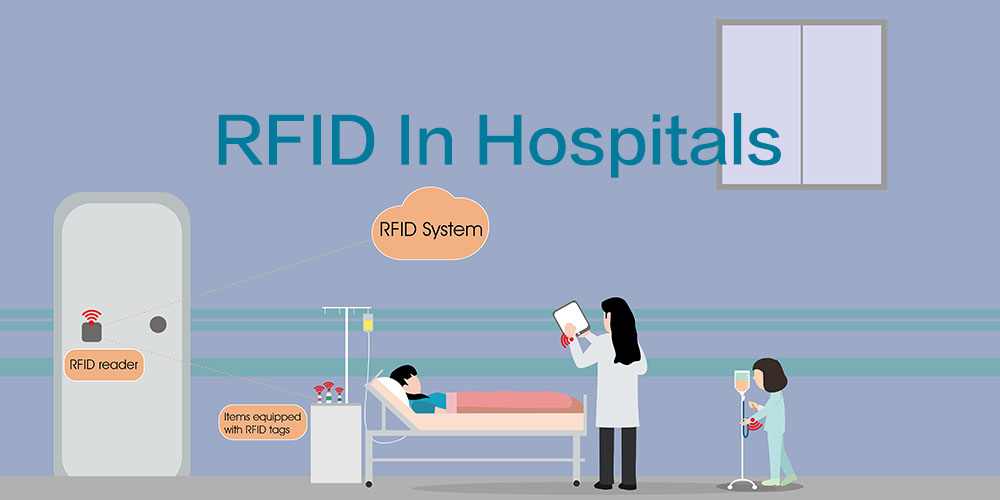Technology plays a crucial role in improving patient care and operational efficiency in the ever-evolving healthcare landscape. One such game-changer is RFID in healthcare. Radio Frequency Identification (RFID) technology is revolutionizing hospitals’ operations, leading to better patient outcomes and streamlined processes. Let’s investigate how smart hospitals harness RFID to enhance patient care and why this technology is becoming indispensable.
What is RFID in Healthcare?
RFID, or Radio Frequency Identification, is a technology that uses radio waves to automatically identify and track tags attached to objects. These objects in healthcare include medical equipment, medications, and even patients. RFID in healthcare transforms hospitals into intelligent hospitals, where real-time tracking and data collection are paramount.
Enhancing Patient Safety
One of the most significant benefits of RFID in healthcare is enhanced patient safety. By using RFID tags on patient wristbands, hospitals can ensure that the right patient receives the right medication at the right time. These tags can store critical information such as patient history, allergies, and treatment plans. Nurses can scan the wristbands to verify patient identity and medication details, reducing the risk of errors.
RFID also helps in tracking patient movements within the hospital. This is particularly useful for monitoring patients with dementia or those at risk of wandering. With RFID, healthcare providers can quickly locate patients, ensuring their safety and well-being.
Improving Inventory Management
Managing medical supplies and equipment efficiently is vital for any hospital. RFID technology simplifies this by providing real-time visibility into inventory levels. Hospitals can track the location and usage of medical equipment, ensuring that essential devices are always available when needed. This reduces staff’s time searching for equipment and minimizes the risk of equipment shortages.
Moreover, RFID helps manage medication inventory. By tagging medication containers, hospitals can monitor stock levels, expiration dates, and usage patterns. This ensures that medications are used before expiration and always available for patient care.
Streamlining Workflow
RFID technology streamlines various hospital workflows, increasing efficiency and reducing costs. For instance, RFID can track surgical instruments in surgical settings, ensuring no items are left inside a patient after surgery. This improves patient safety and reduces the time and cost associated with post-surgery complications.
Patients can be automatically checked in by scanning their RFID wristbands, reducing staff wait times and administrative burden. This allows healthcare providers to focus more on patient care rather than paperwork.
Enhancing Asset Tracking
Hospitals contain valuable assets that need to be tracked and maintained. RFID technology provides a robust solution for asset tracking, ensuring that all equipment is accounted for and maintained properly. For example, infusion pumps, wheelchairs, and diagnostic machines can be tagged with RFID. This allows hospital staff to quickly locate these items, reducing downtime and improving operational efficiency.
Supporting Infection Control
Infection control is a top priority in healthcare settings. RFID can support infection control measures by tracking the movement of equipment and staff. Hospitals can ensure that proper cleaning and sterilization protocols are followed by knowing where equipment has been and who has used it. This helps reduce the spread of infections and maintains a safe environment for patients and staff.
Data Collection and Analysis
RFID technology generates a wealth of data that can be used for analysis and decision-making. Hospitals can track and analyze data on equipment usage, patient movements, and workflow efficiency. This data can reveal patterns and areas for improvement, helping hospitals optimize their operations and enhance patient care. For instance, analyzing RFID data can help identify bottlenecks in patient flow and devise strategies to address them.
Challenges and Considerations
While the benefits of RFID in healthcare are substantial, there are also challenges to consider. The initial cost of implementing RFID technology can be high, and hospitals must ensure they have the infrastructure to support it. Additionally, staff training is essential to ensure the technology is used effectively and efficiently.
Data privacy and security are also critical considerations. Hospitals must ensure that RFID systems comply with HIPAA (Health Insurance Portability and Accountability Act) regulations to protect patient information. Robust encryption and access controls are necessary to safeguard data from unauthorized access.
Future of RFID in Healthcare
The future of RFID in healthcare looks promising, with technological advancements making it even more powerful and versatile. Integration with other technologies, such as the Internet of Things (IoT) and Artificial Intelligence (AI), will further enhance RFID’s capabilities. For instance, AI algorithms can analyze RFID data to predict equipment maintenance needs or patient flow patterns, enabling proactive decision-making.
Conclusion
Incorporating RFID in healthcare is a transformative step toward creating smart hospitals that prioritize patient safety, efficiency, and quality of care. By leveraging this technology, hospitals can enhance patient outcomes, streamline operations, and ensure a safer environment for patients and staff.
If you want to implement RFID technology in your healthcare facility, choose the right RFID partner to guide you. Visit Lowry Solutions to learn more and take the first step towards a more intelligent, efficient healthcare system.


